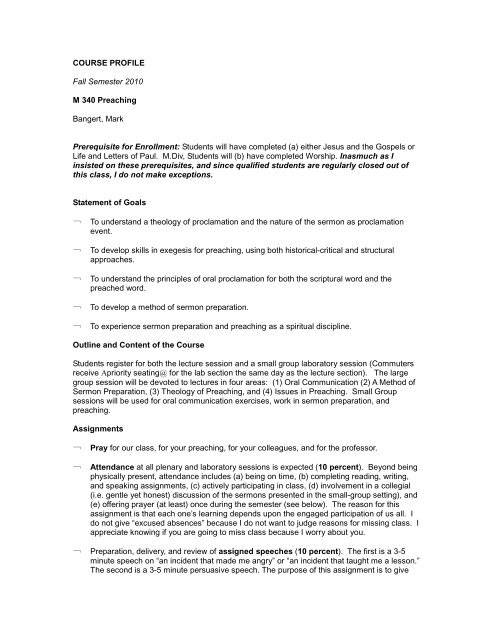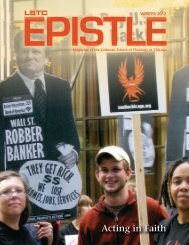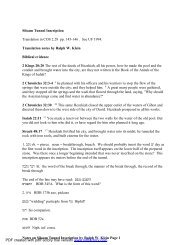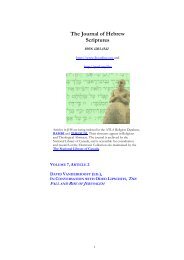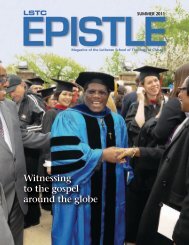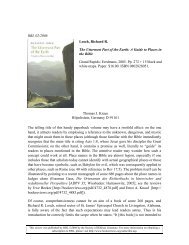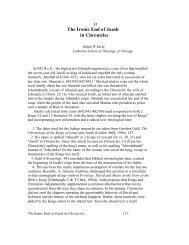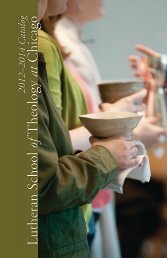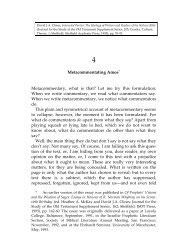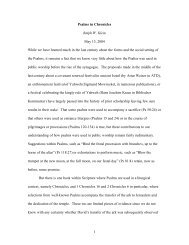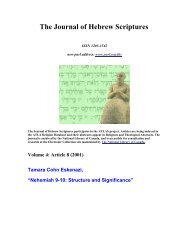Preaching (Plenary)
Preaching (Plenary)
Preaching (Plenary)
- No tags were found...
Create successful ePaper yourself
Turn your PDF publications into a flip-book with our unique Google optimized e-Paper software.
COURSE PROFILEFall Semester 2010M 340 <strong>Preaching</strong>Bangert, MarkPrerequisite for Enrollment: Students will have completed (a) either Jesus and the Gospels orLife and Letters of Paul. M.Div, Students will (b) have completed Worship. Inasmuch as Iinsisted on these prerequisites, and since qualified students are regularly closed out ofthis class, I do not make exceptions.Statement of Goals¬ To understand a theology of proclamation and the nature of the sermon as proclamationevent.¬ To develop skills in exegesis for preaching, using both historical-critical and structuralapproaches.¬ To understand the principles of oral proclamation for both the scriptural word and thepreached word.¬ To develop a method of sermon preparation.¬ To experience sermon preparation and preaching as a spiritual discipline.Outline and Content of the CourseStudents register for both the lecture session and a small group laboratory session (Commutersreceive Apriority seating@ for the lab section the same day as the lecture section). The largegroup session will be devoted to lectures in four areas: (1) Oral Communication (2) A Method ofSermon Preparation, (3) Theology of <strong>Preaching</strong>, and (4) Issues in <strong>Preaching</strong>. Small Groupsessions will be used for oral communication exercises, work in sermon preparation, andpreaching.Assignments¬ Pray for our class, for your preaching, for your colleagues, and for the professor.¬ Attendance at all plenary and laboratory sessions is expected (10 percent). Beyond beingphysically present, attendance includes (a) being on time, (b) completing reading, writing,and speaking assignments, (c) actively participating in class, (d) involvement in a collegial(i.e. gentle yet honest) discussion of the sermons presented in the small-group setting), and(e) offering prayer (at least) once during the semester (see below). The reason for thisassignment is that each one’s learning depends upon the engaged participation of us all. Ido not give “excused absences” because I do not want to judge reasons for missing class. Iappreciate knowing if you are going to miss class because I worry about you.¬ Preparation, delivery, and review of assigned speeches (10 percent). The first is a 3-5minute speech on “an incident that made me angry” or “an incident that taught me a lesson.”The second is a 3-5 minute persuasive speech. The purpose of this assignment is to give
you experience of speaking publicly in this setting before you preach and to learn your styleof oral communication prior to and apart from dealing with preaching.¬ Two short sermon reports (5 percent): Review two sermons, one in your own Christiantradition and one in another Christian tradition. For each sermon, follow this format—donot deviate! Prepare a two-page report, offering the preacher 3 commendations (page 1)and 3 recommendations (page 2). These are to be short paragraphs or 1-3 sentence “bulletpoints.” The assignment is intended to help you listen to sermons critically and to begin theprocess of evaluating them. The assignment is also intended to help you to write concisely.Please follow the above directions!¬ Write a statement of the gospel in fifty (50) words or less (5 percent).¬ Preparation and review of sermons with the instructor for the first three sermons (5percent). The purpose of these sessions is so that I can work with you individually. Theseare live, face-to-face conversations; phone calls and email are not effective for this purpose.Please schedule your appointments for preparation/logjam as soon as possible in the weekprior to preaching; the latest time is 48 hours before the preaching event. Please recognizethat I am meeting with half the class each week, as well as teaching an advanced preachingclass and serving as interim dean of the chapel, so flexibility in scheduling is imperative. Ireserve Friday for other responsibilities, including meetings, writing, completing my ownsermons, and maintaining my own health and well-being. If you would like to explore analternative way of meeting the goal of individual instruction, please make an appointment tosee me.¬ Preach four sermons (50 percent): The first will be on an assigned text. Each student willselect the text for the second sermon; the professor is available for consultation and/orrecommendation. The texts for the third sermon will be selected from Advent/Christmas orLent/Easter Cycle from Year C in consultation with the professor. The fourth sermon will bea 7-8 minute wedding or funeral sermon. After the review of your sermons, whether in classor by the MIC placement, please submit a “Sermon Review/Revision Report” the next week.The format for these reports is found in Appendix A of this syllabus.¬ A short but substantial (6-8 pages) paper entitled “My Theology of <strong>Preaching</strong>” (15percent). This paper is meant to help you formulate your theology of preaching, i.e., whyyou preach. It is also an opportunity to integrate experience, lectures and discussions, andthe reading for the course. Consider these questions: (1) Why do you preach? (2) What doyou preach? (3) What roles do scripture, the world, the preacher, the hearers, the occasion,and God play in preaching? (4) What makes your preaching “Lutheran” (or your owntradition)? This is your opportunity to demonstrate that you have done the reading forthe course! When drawing upon other sources, it is important to cite them (A quick glanceat Professor Satterlee’s book on St Ambrose reveals how much he likes footnotes). You maybe creative in terms of form. Like a good sermon, the emphasis here is on quality notquantity.¬ Download Lecture Outlines from the course website http://lstcnet.lstc.edu/ics/ :Recommended, not required. These are the actual outlines that I use to present classlectures. I make them available to students (1) to more deomocratize the class, in thatteacher and students have the same information, (2) to free students from the burden ofnotetaking so that they can listen to and absorb the lectures, and (3) so students can helpme get back on track if I go off on a tangent. If you need to take notes in order to learn, ormistakenly believe that one does not need to come to class if one has course content, do notdownload these outlines!¬ Journal keeping: Recommended, not required. A preaching journal is often helpful in
charting development of insights for both sermon preparation and for the paper on yourdeveloping theology of the preached word.¬ Prayer before Class. I would like each of you to take a turn offering a brief (corporate)prayer at the beginning of preaching lab. The purpose is to give you an opportunity tocontribute to our spiritual life and develop skills in other ministries of the Word. We will followan invitational model in each small group.¬ Regular Use of the Means of Grace. Corporate worship, hearing God’s Word preached,and making use of the Means of Grace are an essential part of the spirituality of thepreacher. Also, students in this course traditionally lament that there is not more opportunityto hear preaching. Go to church or to chapel. (No, I won’t be taking attendance).¬ Partners in <strong>Preaching</strong>. Strongly recommended. Partner with someone for prayer, support,encouragement, and help. Use partners to share and discuss the readings.¬ Final Review and Assessment of Your <strong>Preaching</strong>. One page: 3 commendations and 3recommendations. Due December 4 at 5:00 PM.¬ Other assignments.BibliographyRequired Readings for the CourseBushkofsky, Dennis L. and Craig A. Satterlee, The Christian Life: Baptism and Life Passages,Using Evangelical Lutheran Worship, Voluume 2, Augsburg Fortress, Minneapolis, MN,2008.Craddock, Fred, <strong>Preaching</strong>, Abingdon, ISBN 0-687-33636-8.Duck, Ruth C., Finding Words for Worship: A Guide for Leaders, Westminster John Knox Press,ISBN 0-664-25573-6.ELCA, Principles for Worship, Augsburg, ISBN 0-8066-7001-0.Hoefler, Richard C., Creative <strong>Preaching</strong> and Oral Writing, CSS, ISBN 0-89536-349-6.Jensen, Richard, Thinking in Story: <strong>Preaching</strong> in a Postliterate Age, CSS, ISBN 1-55673-573-1.Rosser, A., A W e l l-Trained Tongue, LTP, ISBN 1-5685-4124-4.Satterlee, Presiding in the Assembly, Augsburg Fortress, ISBN 0-8066-4299-8.Smith, Christine, <strong>Preaching</strong> Justice, United Church, ISBN 0-8298-1291-1. (Out of Print)Articles on reserve or the course page.RecommendedBrugh, Lorraine S. and Gordon W. Lathrop, Using Evangelical Lutheran Worship: The SundayAssembly, Using Evangelical Lutheran Worship, Voluume 1, Augsburg Fortress,Minneapolis, MN, 2008.Goldberg, N, Writing Down the Bones, Shambhala Publications, ISBN 0-8777-3375-9.Troeger, T., Imagining a Sermon, Abingdon, ISBN 0-6871-8694-3.von Oech, R. A Whack on the Side of the Head, Warner Books; ISBN: 0-4466-7455-9.Additional NoteThose enrolled in the course will receive an email from the instructor with a link to answers toFAQs about <strong>Preaching</strong> Class prior to the start of classes. Or, you may visit the Students page athttp://craigasatterlee.comPosted to LSTC.edu April 16, 2010 - © LSTC - All Rights Reserved.


